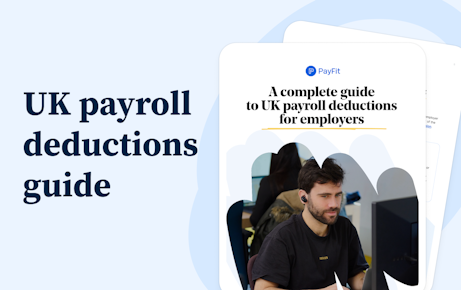Common Deductions From UK Pay - An Outline For Employers

In the UK, deductions from pay can take many forms, including things like taxes and National Insurance Contributions, as well as student loans and court-order repayments.
Here’s an overview of all the different types and kinds of salary deductions you’re likely to run into as an employer.
What are wage or salary deductions?
Salary deductions are when employers take a certain amount of money off an employee’s gross wages to cover things like taxes, benefits or court orders. These ‘deductions’ from pay are normally made through an employee’s paycheck. What’s left after is the employee’s final net income or take-home pay, which they are free to spend as they like or need.
In the UK, deductions from pay fall into two broad categories: voluntary and involuntary. You make voluntary deductions on behalf of your employees. In other words, an employee might decide to ‘give back’ some of their wages to your company. Pension contributions are another excellent example of this.
On the other hand, an involuntary deduction is a payment an employee can’t opt out of. Things like child maintenance or court order deductions from pay fall under this category.
What about Statutory Deductions?
Equally, deductions can be mandated by law. This is another type of pay deduction the government requires from employees to fund various programmes and public services.
Statutory deductions include things like:
National Insurance Contributions (NICs)
Student or postgraduate loans
Workplace pensions*
*though pension contributions are voluntary, in other words, employees have the option to opt out of their scheme, by law they must be enrolled in the first place, which makes workplace pension contributions a statutory deduction.
When should an employer make a deduction from pay?
You must always make deductions that are required by law (such as in the case of tax, court orders or NICs).
If deductions are voluntary or involuntary, then a few rules apply. Based on the Employment Rights Act of 1996, deductions can only be made if:
It’s written in an employee’s contract
It was put in another form of writing and agreed beforehand
It’s a case of an overpayment
It’s something the employer agreed to pay on behalf of the employee - like a trade union subscription
An employee missed work because they were on strike or taking industrial action
It’s always good practice to check any written agreements before making a deduction.
What are the most common deductions from pay in the UK?
Wondering what the most common salary deductions are in the UK? Here’s a list of the main ones you’re most likely to take from an employee’s paycheck:
Taxes
Let’s start with perhaps the most common (and universal) deduction. As Benjamin Franklin once put it, ‘nothing is certain except death and taxes’. In the UK, taxes are deducted from wages through the pay-as-you-earn (PAYE) system, which subtracts taxes based on the employee’s tax code. Of course, there are tax-free allowances to take into account, while benefits and pensions can also affect the amount of tax employees need to pay.
National Insurance Contributions (NICs)
Another mandatory, statutory type of deduction is National Insurance Contributions (NIC). The government uses these payments to fund different kinds of state benefits, from state pensions to healthcare and unemployment benefits. NICs also depend on an employee’s level of earnings and the NIC category they fall under.
Pension contributions
Saving for retirement is an essential goal for employees, which is where pension contributions come in. These deductions are made from an employee’s earnings to be added to their pension scheme.
It’s your responsibility, as an employer, to enrol employees into a workplace pension scheme and deduct a percentage of their wages to fund their retirement pot. Employees can also make additional voluntary contributions to boost their savings even further.
Student loan repayments
It’s not uncommon for younger employees to take out student loans to fund their higher education. As such, deductions from pay are made in order to cover student loan repayments. The amount subtracted is adjusted to account for the employee’s income and their loan repayment plan.
Court orders
In some cases, court orders might require employers to deduct money from an employee’s salary. These payments are used to cover legal obligations when an employee has outstanding payments they need to make towards a particular case.
Court-order deductions from pay will be taken after taxes and NICs have been subtracted and can be taken as either a specific amount or a percentage of wages.
Child Maintenance
Similarly, employees who have child maintenance obligations could have deductions taken from their salary. In these cases, the government’s Child Maintenance Service will usually determine the amount that needs to be deducted. Court orders can also apply here.
Union Fees
These are fees taken to cover an employee’s trade union membership if they’re a part of one. This is one example of a deduction that the employee needs to agree to ahead of time before it can be taken through payroll.
Benefit deductions
Some employee benefits may also incur deductions. Health insurance and gym memberships are the most common examples here. These payments are used to cover or subsidise part of these membership schemes.
Absence deductions
Whether it’s sick, unpaid, or another type of leave, there are many reasons an employee could be absent from work. In some of these instances, you may need to make a deduction from pay, depending on your company’s policy. A clear policy here will help make these absence deductions consistent and fair for employees.
Deductions to correct overpayments
If an employee was overpaid as a mistake, you can deduct the excess amount from future wages.
Loan deductions
Finally, if an employee is receiving a loan from your company, these can be repaid via deductions as well.
Can I deduct holiday pay from someone’s final salary?
Sometimes, an employee might overtake their holiday entitlement. In these cases, it can be tricky to ‘claim back’ holiday pay as there is no statutory right that enables employers to automatically claw back the overpayment.
The only way to do this is by ensuring you have a clause in the employee’s contract that clearly states you can do this. Without this, there isn’t really a way to deduct holiday pay from someone’s final salary.
Never miss another deduction again
If you’re constantly worrying about missing or miscalculating your deductions, you might want to consider payroll software.
Making deductions manually can be a drag on your time. But with software like PayFit, payments become a breeze as they’re automatic - no reminders or complex spreadsheets involved. Real-time salary adjustments reflect instantly on payslips, meaning you can run payroll in minutes instead of hours.
To learn more, sign up for one of our informative demos. One of our product specialists will give you a tailored and detailed walkthrough of what PayFit can do for your business.








